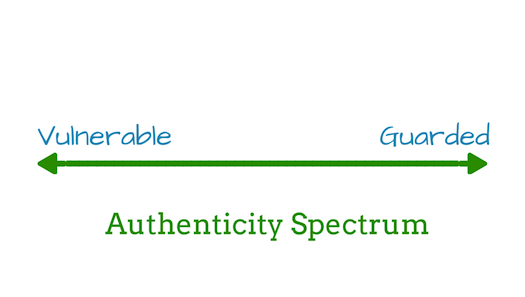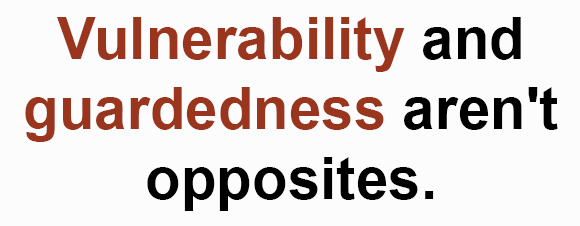When ‘Being Real’ Backfires
By Joel Mayward
This post originally appeared on Joel Mayward’s personal blog.
The language of “authenticity” has become ubiquitous in evangelical church circles. To be authentic is to be Christian. I almost included it as #9 on the list of 8 cliché youth ministry phrases, but this word goes beyond youth ministry into the larger church culture. More than just a common church term, it’s a key value to the Millennial generation, almost more than any other word or phrase:
Be real.
Be true to yourself.
Be genuine.
This is just who I am, take it or leave it.
If you’re going to be anything in this world, be authentic.
Here’s the thing: there is no biblical command for authenticity.
There is language in Scripture about living in the truth, speaking the truth in love, confessing one’s sins, and bearing one another’s burdens. There is the language of sincerity: “love must be sincere” (Rom. 12:9). But I can’t find an explicit command in Scripture to “be real” or “be authentic.” The word authentic doesn’t appear once in the NIV, ESV, NASB, or NLT translations of the Bible. It does show up three times in The Message, most notably in Philippians 4:8, which replaces the word pure with authentic.
Authenticity can become an excuse for sinful behavior. This is using authenticity as a crutch, saying “I’m just being real” to justify unhealthy behavior. This sort of authenticity can cause all sorts of problems. While God does call us to live in the truth, there is also a place for healthy boundaries, emotional self-awareness, and recognizing when a relationship or a community is safe to express our authentic self. There’s a danger in over-sharing, placing our reputations and our hearts into the hands of strangers who may abuse our trust.
Many of the baby boomers I know just don’t get why their millennial children are sharing pictures of their dinner or embarrassing self-portraits on the Internet. The older generation—or those older in spirit—talk about not wanting to “air their dirty laundry” with others. They are guarded about their own struggles and doubts and failures, highly aware of social propriety and not wanting to make a fuss. Yet I wonder if they also quietly struggle with deep shame and brokenness, which often spills out into everyday life in (noticeable) bad habits or fears.
 On the other hand, Millennials and the younger generation are eager to share everything they can with everyone, ugliness and all. Their relational mishaps, their mistakes, their triumphs, their opinions—it’s all recorded and shared via social media. They’re confused when an employer won’t hire them due to a Facebook profile picture, or when someone is genuinely concerned or offended when they start making unhealthy life choices. “I’m just being myself. You can’t judge me,” they say. Yet there is wisdom in building boundaries and recognizing when I’ve over-shared. I’ve had people emotionally vomit on me—or on the Internet—with problems and issues that should have been handled in a more private setting.
On the other hand, Millennials and the younger generation are eager to share everything they can with everyone, ugliness and all. Their relational mishaps, their mistakes, their triumphs, their opinions—it’s all recorded and shared via social media. They’re confused when an employer won’t hire them due to a Facebook profile picture, or when someone is genuinely concerned or offended when they start making unhealthy life choices. “I’m just being myself. You can’t judge me,” they say. Yet there is wisdom in building boundaries and recognizing when I’ve over-shared. I’ve had people emotionally vomit on me—or on the Internet—with problems and issues that should have been handled in a more private setting.
Too much authenticity negates relational trust. It rushes a relationship far past its present capacity, and it creates an anxiety about whether or not the person will over-share or over-step relational boundaries.
I’m learning there’s an authenticity spectrum.
It’s marked by two contrasting postures, held in tension by their approach to public genuineness.
 On one end of the spectrum is being vulnerable. This is an open posture, where you can be honest about brokenness and joy with sincerity of heart. It’s being real, especially about your failures and struggles and shame. It’s bringing yourself out of the darkness into the light.
On one end of the spectrum is being vulnerable. This is an open posture, where you can be honest about brokenness and joy with sincerity of heart. It’s being real, especially about your failures and struggles and shame. It’s bringing yourself out of the darkness into the light.
On the other end of the spectrum is being guarded. This is a reserved posture, having healthy boundaries and a clear sense of who your can trust with your heart. It’s being cautious and discerning, guarding your heart with wisdom and choosing relationships marked by sincerity and grace.
Vulnerability and guardedness aren’t necessarily opposites, but they create a natural tension.
It’s difficult to be vulnerable and guarded in the same moment. Yet both are necessary to foster trust in relationships, and doing too much of one or the other can break that trust. So what does healthy authenticity look like? Can we be both guarded and vulnerable?
 The perfect model for authenticity is Jesus (of course). He was his true self everywhere he went, uncaring about social propriety or what others would say, while still remaining culturally aware. He was remarkably approachable. He was vulnerable and honest, open about his pains and doubts in Gethsemane while clear about his mission and the good news of the kingdom. He was also guarded, taking time to be secluded and alone, not driven by the crowds’ needs or desires, but able to stay focused on his mission while finding his worth by abiding in the Father. When I look to Jesus and abide in him, I can learn to be my fullest, truest self in every part of my life, living in freedom from shame or social anxiety.
The perfect model for authenticity is Jesus (of course). He was his true self everywhere he went, uncaring about social propriety or what others would say, while still remaining culturally aware. He was remarkably approachable. He was vulnerable and honest, open about his pains and doubts in Gethsemane while clear about his mission and the good news of the kingdom. He was also guarded, taking time to be secluded and alone, not driven by the crowds’ needs or desires, but able to stay focused on his mission while finding his worth by abiding in the Father. When I look to Jesus and abide in him, I can learn to be my fullest, truest self in every part of my life, living in freedom from shame or social anxiety.
Perhaps that’s the secret to Christ-like authenticity: a constant abiding in God and a life motivated by mission. When I can find my whole worth and vocation outside of myself, recognizing identity as a gift to receive rather than a persona I must create, I am free to be vulnerable, wise to be guarded, and healthy in practicing authenticity.
Where do you find yourself on the authenticity spectrum? Why are you drawn towards one side or the other?
About the Author
Guest Contributor
The LeaderTreks Blog is proud to share the hard-earned wisdom of student ministry leaders from many different backgrounds and professions. From time to time, we will feature guest blog posts from writers other than our regular contributors. We include these posts to provide additional perspectives and insight that we’re sure will help develop you and your ministry… Read More




